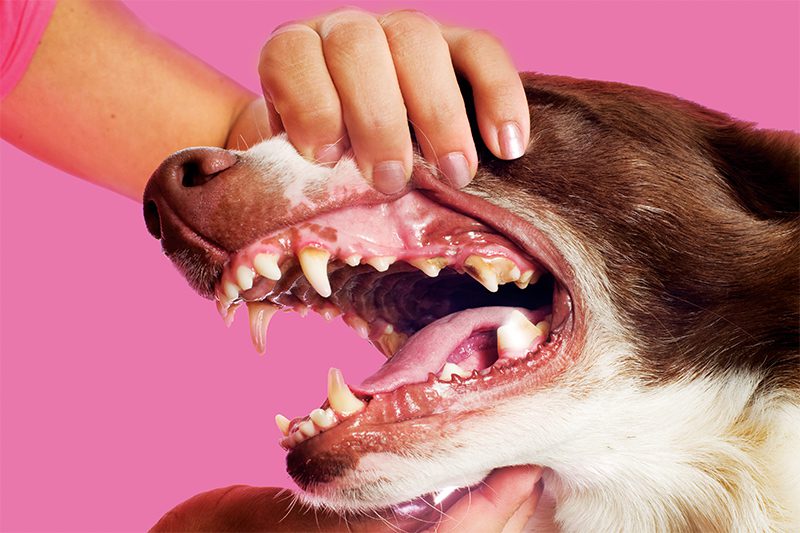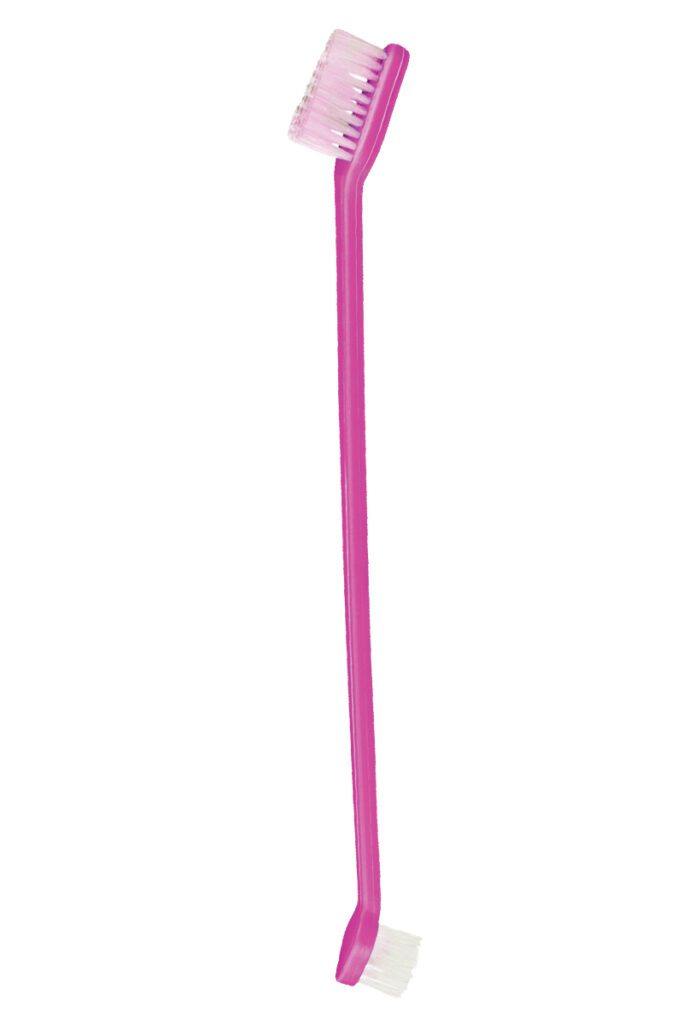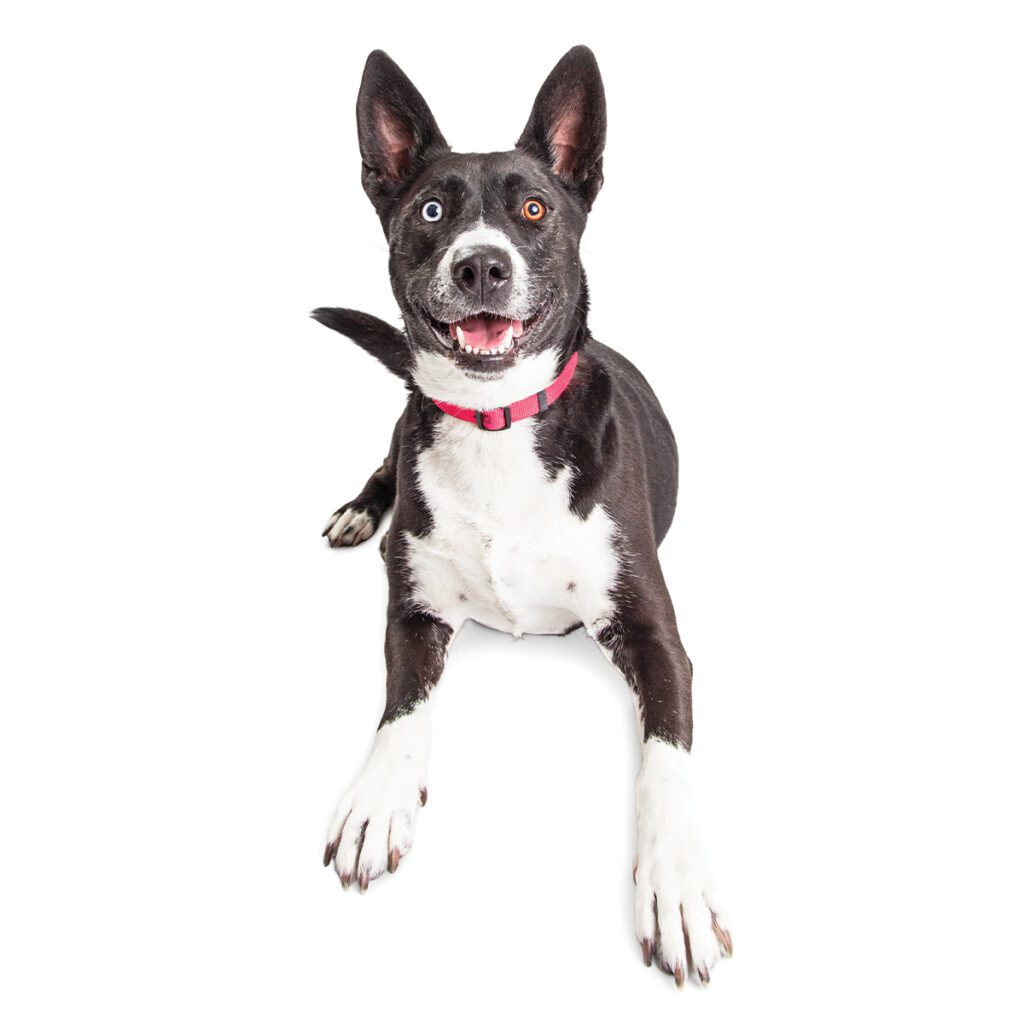Dental Care for Your Four-Legged Friend
Dental health is just as important for pets as humans! It requires regular maintenance interspersed with professional cleanings and procedures when necessary. Unfortunately, oral hygiene is often one of the most under-maintained areas of animal health. In fact, periodontal disease – an inflammatory disease affecting the soft and hard tissue around the teeth – is the most common condition that occurs in adult cats and dogs. It is also entirely preventable. Here, local experts weigh in with their professional advice for keeping your furry loved one’s mouth in top-notch shape.
What Are Signs of Poor Dental Health?
There are several signs owners can watch for that indicate a deterioration in their dog or cat’s dental health. As soon as you notice any of these, it’s always a good idea to examine their situation further and if needed, take them to their veterinarian. According to Ashley Kirch, Head Groomer at The Ark Pet Spa & Hotel, some signs to watch for are:
- If they stop eating or eat less than normal
- If they are drooling excessively
- If they seem depressed, unresponsive, or lethargic
- If you notice any bleeding, their jaw or face is swollen, or there are other visible signs of physical distress
- If their breath is extra offensive

“One of the most accessible indicators used in determining your pet’s oral condition is their gums. You can lift the sides of their mouth to check their gums for any redness, sensitivity, swelling, or bleeding daily or weekly. Signs like these would indicate they need medical attention,” Kirch explains.
If these signs and symptoms persist or worsen, or if they are severe at the time you notice them, it’s advisable to take your cat or dog to the veterinarian. If the issues go untreated, they can lead to other health complications for your pet.
What Are Complications Associated with Poor Dental Health?
There are numerous complications that can spring from poor dental health, one of the most severe being periodontal disease. Once the condition of your pet’s mouth reaches this level, it can lead to additional health issues such as:
- Autoimmune disease
- Diabetes
- Lung, kidney, or heart infection
- Heart failure
- Arthritis
- Spinal diseases
- Cancer
- Pain, bad breath, unkempt coat
- Deterioration of body condition
- Tooth loss
- Sinus infection
- Sepsis (infection in the bloodstream)
- Shortened lifespan
What Happens During a Professional Cleaning?
This is a lengthy process that usually requires leaving your dog or cat at the vet’s office. The actual cleaning process lasts anywhere from 45 minutes to an hour and a half, depending on the condition of your pet’s mouth, and any specific dental work such as extractions that may need to be done. The good news is, your furry friend should get to come home the same day. Here, Dr. Tyler Pilkington, co-owner of Animal Clinic, Inc., explains the entire cleaning procedure:


“A thorough physical exam, including examination of the teeth and oral cavity, precedes any procedure or recommendation, and routine bloodwork is often recommended prior to anesthesia.
Following the exam, an intravenous catheter is placed to administer fluids before, during, and shortly after anesthesia. These support heart and kidney function.
Next, a balanced injectable pain medicine is administered, and an “induction agent” that helps put your pet to sleep is given through the IV catheter. A tube is placed in the airway to deliver both oxygen and the anesthetic gasses. This tube, called an endotracheal tube, protects the airway from any debris or fluids throughout the procedure.
Once the pet is fully anesthetized, each tooth and tooth attachment is evaluated and probed. Cavities and pockets in the gums or periodontal ligament are identified and addressed. In some cases, extractions are necessary. Finally the teeth are polished and the pet is woken up. Antibiotics are administered or prescribed when needed.”
Why Does My Pet Have to Have Anesthesia for Dental Procedures?
While it can be a little scary to let a loved one be put under anesthesia, it is actually the safest route for a thorough, sanitary, professional cleaning. Unlike your dentist, veterinarians can’t give verbal cues and instructions to animals while working in their mouth. As a result, full access to the mouth is nearly impossible to obtain while your pet is awake. Additionally, alternative sedatives can lead to numerous other complications. They also don’t allow for the important endotracheal tube to be placed and protect your pet from debris and fluids being caught in their airway. So, leave it to the highly trained professionals to send your friend home with a sparkling smile.
How Can Owners Help Keep Their Pets’ Mouths Healthy?
“Daily brushing is the gold-standard,” says Dr. Pilkington. However, if it isn’t possible to brush their teeth every day, or if it’s a struggle for your pet to cooperate, there are other methods you can add to the mix. Gels, sprays, and water additives are all helpful additions to well-rounded oral hygiene routines. “Make sure you look for products with an enzyme if you want them to be effective,” Kirch explains.
Additionally, specially formulated dental chews can be very effective. Offer pets chew toys, and if possible serve them hard food. Anything abrasive helps keep plaque and tartar scraped off teeth.
How Can I Start My Pet Down a Path Toward Good Dental Health?


If your furry friend is not too fond of tooth brushing time, you may need to help them adjust to the process. The younger they are when you begin introducing them to this process, the more receptive they’re likely to be. If they need additional coaxing, Dr. Pilkington advises, “Use positive reinforcement. My dog is much more willing to let me brush his teeth now that he knows a treat is waiting on the counter!”
But most importantly, remember that you are your pet’s keeper. Their health is dependent on your vigilance in caring for them. Establish healthy routines of examining their mouth and observe their demeanor. Incorporate oral hygiene habits into your regular routines and you can help increase their lifespan, comfort, and happiness.


Ashley Kirch
Head Groomer, The Ark Pet Spa & Hotel


Dr. Tyler Pilkington
Co-Owner & Veterinarian, Animal Clinic, Inc. of Chattanooga




